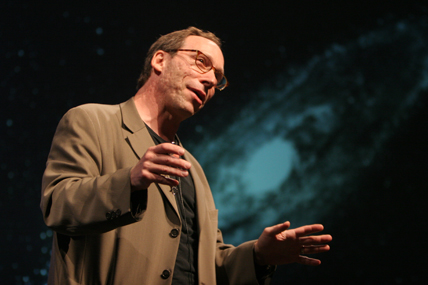Wabash College will host Phi Beta Kappa Visiting Scholar, Lawrence Krauss, who will give a talk on "Science, Non-Science, and Nonsense: From Aliens to Creationism" at 8 p.m. Monday, January 28, in Salter Hall in Fine Arts Center.
 Home page photo and photo at right courtesy of the Krauss website. Photo by Jessica Lifland.
Home page photo and photo at right courtesy of the Krauss website. Photo by Jessica Lifland.
"In March of 1996, the U.S. Presidential candidate Pat Buchanan said on national television that he wasn’t descended from apes, and he didn’t think that children should be taught that they are, Krauss explaining his talk. Not a single U.S. journalist questioned him on this position. In 1999, the Kansas School Board removed evolution and discussions of the Big Bang from its curriculum, in spite of the fact that these are not controversial scientific issues. In 2002, the state of Ohio considered introducing the concept of Intelligent Design into the high school biology curriculum, in spite of the fact that this concept does not appear in the scientific literature. I will show examples from the news, advertisements, TV shows and movies, as well as from my books, to discuss the difference between science and fiction and to explore how the distinction between sense and nonsense is becoming blurred in popular discourse. I will also address the important issue of what science is, and what it is not. The lecture will be part ‘tour’ through the fascinating world of modern physics, part fun-filled examination of video clips, and part sober discussion of the various dangers facing modern society if we fail to learn the lessons science has taught us about the world. We must not be timid about offending sensibilities when those sensibilities are based on nonsense"
Krauss is an internationally known theoretical physicist with wide research interests, including the interface between elementary particle physics and cosmology, where his studies include the early universe, the nature of dark matter, general relativity, and neutrino astrophysics. He has investigated questions ranging from the nature of exploding stars to issues of the origin of all mass in the universe. He received his undergraduate degrees in both mathematics and physics at Carleton University. He received his Ph.D. in physics from the Massachusetts Institute of Technology, then joined the Harvard Society of Fellows. He joined the faculty of the departments of physics and astronomy at Yale University as assistant professor in 1985, and associate professor in 1988. In 1993 he was named the Ambrose Swasey Professor of Physics, Professor of Astronomy, and chairman of the department of physics at Case Western Reserve University. He served in the latter position for 12 years, until 2005. During that period he built up the department, which was ranked among the top 20 Physics Graduate Research Programs in the country in a 2005 national ranking. Among the major new initiatives he spearheaded was the creation of one of the top particle astrophysics experimental and theoretical programs in the U.S., and the creation of a groundbreaking masters program in physics entrepreneurship. In 2002, he was named Director of the Center for Education and Research in Cosmology and Astrophysics at Case.
Krauss is the author of over 200 scientific publications, as well as numerous popular books, including, The Fifth Essence: The Search for Dark Matter in the Universe (Basic Books, 1989), which was named Astronomy Book of the Year by the Astronomical Society of the Pacific, and Fear of Physics (Basic Books, 1993), now translated into 12 languages.
In addition to his Monday evening talk, Krauss will give a noon time talk on Tuesday, January 29, on "Einstein’s Biggest Blunder?: A Cosmic Mystery Story." The talk will take place in Baxter Hall, room 101.
Both lectures are free and open to the public.
For more information see: